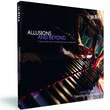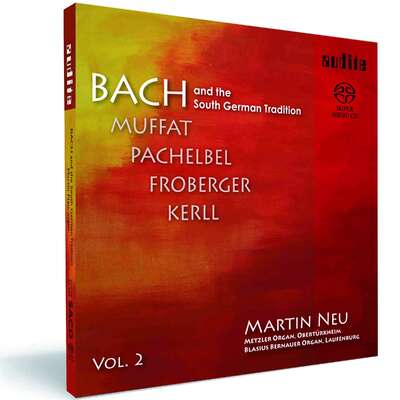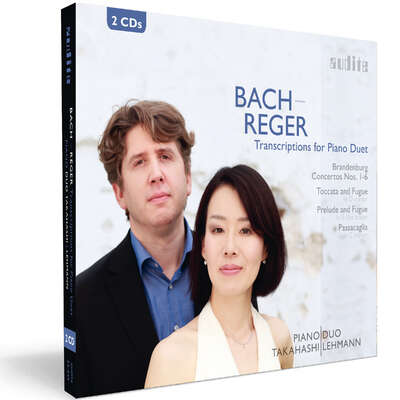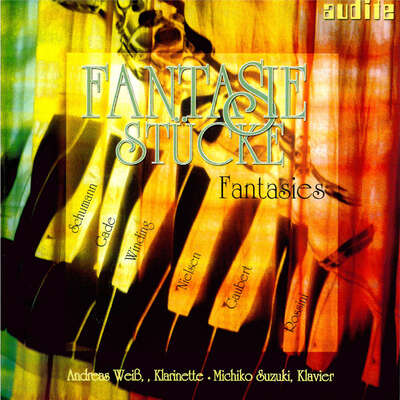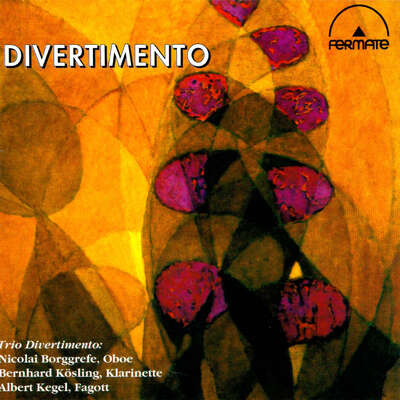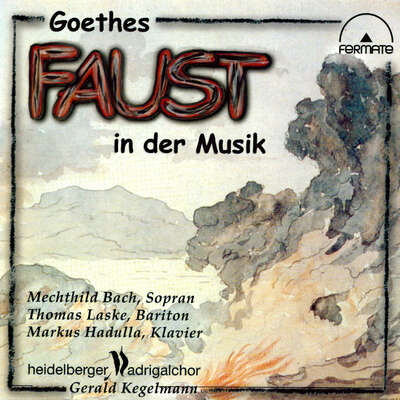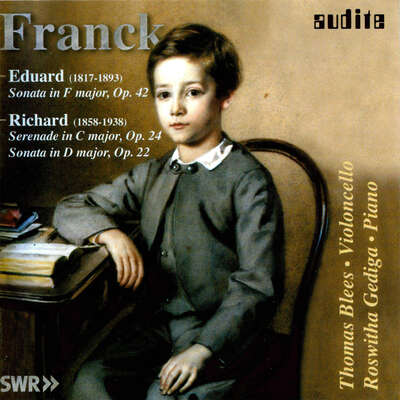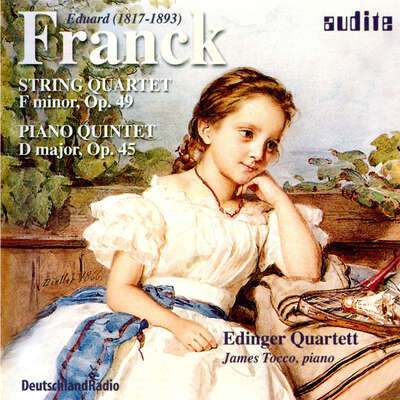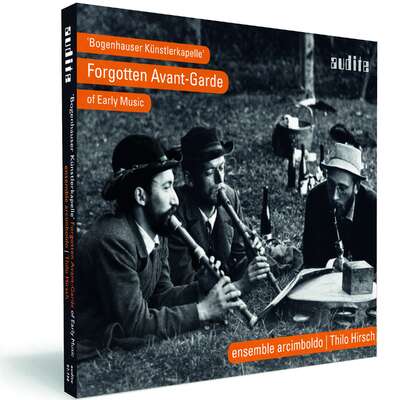
Die dritte audite-CD des Piano Duos Takahashi|Lehmann präsentiert Transkriptionen bereits existierender Werke und Originalkompositionen, durchdrungen von musikalischen Zitaten und Anspielungen. Die Annäherung an bestehende Musik im Rückgriff auf die Musikgeschichte erfolgt in verschiedensten Gradierungen und spannt den Bogen vom (fast) originalen Notentext bis hin zur Auflösung des klassischen Zeit- und Epochenbegriffs.mehr
"Das Duo Takahashi-Lehmann spielt dieses anspruchsvolle Programm mit bestechender Klarheit und, besonders in den langsameren Stücken, sehr stimmungsvoll." (Pizzicato)
Details
|
Allusions and beyond
Transcriptions and transformations for piano duo |
|
| Artikelnummer: | 97.700 |
|---|---|
| EAN-Code: | 4022143977007 |
| Preisgruppe: | BCA |
| Veröffentlichungsdatum: | 23. September 2016 |
| Spielzeit: | 69 min. |
Zusatzmaterial
Informationen
Musikalische Transformationen für Klavier zu vier Händen
Das PianoDuo Takahashi|Lehmann legt seine nunmehr dritte CD-Produktion bei audite vor. Sie enthält zum einen Transkriptionen bereits existierender Werke, zum anderen Originalkompositionen, die durchdrungen sind von musikalischen Zitaten und Anspielungen auf Werke anderer Komponisten. Die Annäherung an bestehende Musik im Rückgriff auf die Musikgeschichte erfolgt in verschiedensten Gradierungen und spannt den Bogen vom (fast) originalen Notentext bis hin zur Auflösung des klassischen Zeit- und Epochenbegriffs.
György Kurtágs Bearbeitungen Bach'scher Choralvorspiele und Max Regers Transkription des Fünften Brandenburgischen Konzerts übertragen einen unverändert übernommenen Notentext von einem Medium (Orchester oder Orgel) auf ein anderes (Klavier zu vier Händen); Kurtág wählte geistliche Werke, Reger ein weltlich-konzertantes Stück. Kurtágs Übersetzungen für zwei Pianisten entstanden aus der kontemplativen Versenkung in Bachs Stücke; Reger gelang ein klares konzertantes, dabei aber immer durchsichtiges Opus für zwei Spieler an einem Klavier.
Zu Brahms' Haydn-Variationen und Bernd Alois Zimmermanns Monologen haben ihre Komponisten auch alternative Versionen mit Orchester hinterlassen; bei Zimmermann weichen die Fassungen so stark voneinander ab, dass man bei der vorliegenden Version für zwei Klaviere von einer Neukomposition, einer neuen, zweiten Betrachtung der Werkidee und des musikalischen Materials sprechen muss. In Form zahlreicher Zitate integrierte Bernd Alois Zimmermann Transformation als (An-)Verwandlung historischer Musik ebenso in seine Monologe wie die Spannung zwischen Geistlichem und Weltlichem. „Musik über Musik" wird bei ihm nicht nur zur bloßen Nachzeichnung des großen Zeitbogens, der aus der Ära Bachs in unsere Gegenwart herüber reicht, sondern löst den Zeitbegriff epochenübergreifend aus ihrer Linearität.
Wieder beleuchtet das PianoDuo Takahashi|Lehmann den facettenreichen Kosmos von Klaviermusik für vier Hände an ein und zwei Klavieren. Mit gewohnt virtuos-fundierter Klaviertechnik versteht es das Duo, programmatisch-intellektuelle Konzeption und leidenschaftliche Expressivität zu verbinden. Sein gleichermaßen kluges wie berührendes Musizieren erschließt dem Hörer auch zunächst abstrakt erscheinende Werke.
Besprechungen
Fanfare | February 2017 | Raymond Tuttle | 1. Februar 2017 | Quelle: http://www.fanfa...
This is Piano Duo Takahashi-Lehmann’s third disc for Audite. The first, Originals and Beyond (Audite 97.706), contained arrangements for piano fourMehr lesen
There are surprisingly few recordings of Max Reger’s very convincing arrangements of Bach’s six Brandenburg Concertos. In fact, the only recording of all six of them—as far as I know, anyway—is a set that was released on LP by the Musical Heritage Society, featuring pianists Martin Berkofsky and David Hagan. It’s serviceable, although aggressively recorded, and (obviously) out of print. Peter Rösel and Santiago Rodriguez also recorded Concerto No. 5, for Elan Recordings. That’s a better recording, but it is even harder to find than the MHS LPs. Let’s hope that this strong and joyful performance by Piano Duo Takahashi-Lehmann encourages Audite to ask these performers to record the remaining five. I’d buy it.
György Kurtág’s Bach transcriptions are somewhat better represented on disc, including on an ECM New Series disc that features the composer himself with his wife, Márta. These are extraordinarily subtle works. For example, at times Kurtág asks the pianists to cross their own or each other’s arms as they play. This is not a circus stunt, but still trickery of a sort, because the departure from traditional playing positions forces a rethinking of the music, and thus produces changes in the “expressive microcosm,” to use the booklet annotator’s apt phrase. A YouTube video (youtube.com/watch?v=Z8lTh58jhA8) of the aged Kurtágs playing some of these works is very moving, but the present performers certainly are sensitive to what is going on here, and these are beautiful readings. It’s worth mentioning that Kurtág’s setting of O Lamm Gottes unschuldig uses doublings of the melody at octaves or fifths in order to mimic an organ’s overtone stops. You will swear that another instrument is being played, but it’s all piano!
For Bernd Alois Zimmermann’s Monologues, Norie Takahashi and Björn Lehmann leave each other’s side for 18 minutes and sit at their own pianos. (They remain separated for the Brahms.) Monologues contains five sections, and most of them include fragments of music by Bach, Beethoven, Debussy, and Messiaen to create what the composer called “music about music.” Zimmermann had the idea that time was not a line but a sphere, and that cosmic time and an individual’s “inner time” were not necessarily in sync. He described this as “pluralistic chronological simultaneity,” and expressed it musically through the insertion of quotations into his own works. Thus (we are asked to consider in the booklet note), his Monologues “embody the concept for this CD.” Whether you buy that or not probably will determine how you feel about Monologues. Perhaps ironically, it seems a little dated to me, but I might need more time to grow into it. The present performers plunge into this work unreservedly.
The last piece on this CD is Brahms’s famous Haydn Variations. The version for two pianos predated the orchestral version. Other than that, little needs to be said about the music itself, probably. As for the performance, I find it refined, hush-hush sensitive, and interpreted almost to the point of preciousness. It’s as if Elisabeth Schwarzkopf cloned herself and both of them took up the piano. My impression of Brahms was that he was unaffected, and that’s a quality I listen for in his music as well. Piano Duo Takahashi-Lehmann seems to have other ideas, and while I can respect them I do not share them. This is fussy, finicky Brahms.
I’ll come back to this disc for the Bach/Reger and the Bach/Kurtág, and not so much for the Zimmermann and Brahms. There’s no denying, however, that Norie Takahashi and Björn Lehmann are thoughtful and superbly capable musicians.
American Record Guide | February 2017 | James Harrington | 1. Februar 2017 | Quelle: http://www.ameri...
This disc would be worth getting if all it contained were the wonderful performance of Brandenburg Concerto 5 in Reger’s piano duet version. Add theMehr lesen
One is not even aware of the tremendous difficulties required to keep all of Bach’s counterpoint clear or the interweaving lines smooth and flowing. It is a performance that uses all of the tonal resources of a modern piano in the most musical ways. It was originally written for solo harpsichord, violin, flute, and string ensemble. Bach was showing off both his own keyboard skill and the new two-manual harpsichord he had just acquired. The first movement cadenza is one of those legendary parts that every keyboard player admires. Reger saw fit to divide it among 4 hands, with virtually no extra notes. The challenge so wonderfully met by Takahashi and Lehmann is to make it sound like only two hands.
Bernd Alois Zimmermann (1918–70) wrote his Monologs for 2 pianos in 1964, a significant reworking of his Dialogs for 2 pianos and large orchestra from 1960. I was impressed with this large five-movement work as performed by the Huber-Thomet Duo (Wergo 6809, May/June 2015). Here it is a little faster and performed as well. It will not be to everyone’s liking, but it is a well-written and always interesting work.
The Bach Chorales and Brahms Variations are beautiful music, very well performed. The Brahms lacks a little of the excitement I like in the two Argerich recordings (Teldec, May/June 1995; EMI 58472). Excellent piano sound from Audite and comprehensive booklet notes complete this outstanding release.
www.musicweb-international.com | February 2017 | Dominy Clements | 1. Februar 2017 | Quelle: http://www.music...
Norie Takahashi and Björn Lehmann’s piano duo has been around since 2009 and already has two previous releases on the Audite label: “OriginalsMehr lesen
Max Reger’s admiration for Johann Sebastian Bach knew no bounds, and he made around 150 transcriptions of his works, of which this Fifth Brandenburg Concerto is a fine example. This kind of music in piano duet can easily sound rather dated, and as a domestic entertainment it certainly belongs firmly in that period before we became provided with the passive ease of broadcast music. Takahashi/Lehmann turn in a nice performance with plenty of life and expression, not attempting to introduce ‘authentic’ atmosphere but also not making Reger’s version of the piece into anything heavier than it need be.
Equally if not more intriguing are György Kurtag’s transcriptions of Bach. Kurtag as a composer is quite an uncompromising modernist, but timid listeners need have no fears with regard to these tracks. Bach’s music is kept intact while the colour of the piano is broadened as an organ might with extra stops, adding octaves or fifths here and there and exploring contrasting registers for instance in the rumbling textures of Aus tiefer Not schrei ich zu Dir. The added notes in O Lamm Gottes, unschuldig give the upper register a remarkable toy piano/music box effect.
With Bernd Alois Zimmermann we enter the world of two pianos as well as that avant-garde tension in which artistic abstraction meets the challenges of time and tradition. Zimmermann’s work in this period involves much layering of time in every sense, and the allusions here appear in unexpected musical quotes that emerge and mix with each other, pitting Bach against Messiaen, Debussy, Mozart and other elements including fragments of jazz. This is ‘music about music’: demanding, but with an acceptance of its poetic impact by no means unrewarding. Zimmermann’s stormy rages and sunlit shafts of beauty are to my mind like Beethoven’s – only difficult in their requirement of focus and clarity, and the musicians here certainly give a virtuoso demonstration of communicating the force and “imploring appeal” of this score.
The musical contrast here between Monologues and Brahms’ Variations on a Theme by Haydn could hardly be greater, but creates its own moment of musical magic. Takahashi/Lehmann play this work with plenty of detailed consideration, only giving in to legato richness where the variations demand it, but with nicely proportioned dynamic contrasts and articulation giving as much clarity as they deliver with the other works in this programme. Collectors will have their own favourites when it comes to recordings of this work, and I have my own soft spot for the heightened drama from Martha Argerich and Nelson Freire in their live Deutsche Grammophon recording (review), but this version will do very nicely.
Beautifully recorded and nicely presented, this is the kind of release I have no hesitation in recommending to anyone looking for a meaty and entertaining adventure into the toothsome sonorities of good piano duo playing.
www.pizzicato.lu | 09/10/2016 | Remy Franck | 9. Oktober 2016 | Quelle: http://www.pizzi... Interessante Duo-Platte
Das Piano Duo Takahashi-Lehmann legt seine nunmehr dritte CD-Produktion bei Audite vor. Sie enthält Transkriptionen bereits existierender Werke sowieMehr lesen
Record Geijutsu | October 2016 | 1. Oktober 2016 Spezielle Empfehlung
Japanische Rezension siehe PDF!Mehr lesen
Hessischer Rundfunk | HR 2-Kultur, CD-Tipp, 22.09.2016 | Meinolf Bunsmann | 22. September 2016 BROADCAST CD-Tipp
hr2-kultur - der CD-Tipp. Ein Klavierduo teilt sich entweder die 88 TastenMehr lesen
